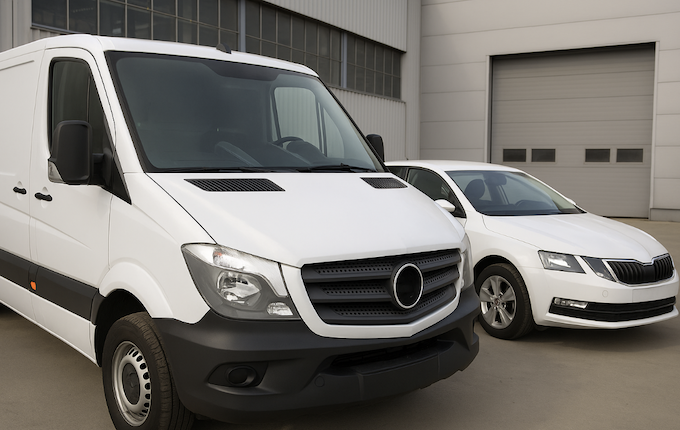
CheckIn@Work & CIAO: obligations, mistakes and tips for SMEs in Belgium
CheckIn@Work and CIAO are mandatory Belgian registration systems. Learn the differences, mistakes to avoid and solutions for SMEs and subcontractors
Read more
For many Belgian SMEs in sectors such as cleaning, engineering, maintenance and construction, travel to customers is a daily occurrence. Transparency around these travel costs is essential to maintain trust and avoid bill surprises. Customers clearly want to know what they are paying for, while companies want to correctly recover their own costs (fuel, employee time, vehicle wear and tear, etc.). A clear policy on recording and invoicing mileage contributes to professional customer management as well as a smooth internal HR policy. It also helps avoid discussions or ambiguities and keeps your company legally compliant.
A correct mileage administration is not only good for customer relations, it is also required by legislation. Some important references for SMEs in Belgium:
Calculating mileage correctly for trips to customers starts with good arrangements and accurate record keeping. Some points of interest:
Determining the right relocation rate is a balancing act between cost recovery, market conformity and transparency. Some guidelines:
Manually tracking miles driven and hours worked is time-consuming and error-prone. Fortunately, technology can greatly simplify this process. Integrating time and mileage tracking with your invoicing system not only saves you administrative hassle, you also increase the accuracy of your invoices. And with the upcoming introduction of e-invoicing through Peppol in 2026, digital integration is no longer a luxury, but a necessity.
Say your employee drives to three customers in the morning and spends an hour of work time at each. If you track this route digitally, the system can record, for example, that a total of 80 km has been covered and 3 hours worked. This data can then be automatically read into the invoicing tool, so that both working hours and travel kilometers appear on customer invoices. No need to manually look up distances or retype times - which not only saves time but also prevents errors. In addition, this provides the customer with a detailed invoice, which enhances professionalism.
What is important here is that you correctly link the movements to the correct customer or project. A good time registration and invoicing software allows you to immediately select the customer or project when registering a trip. This allows you to build up a log of hours and kilometers driven for each customer. When invoicing, you can then easily list and charge all related trips and services per customer. This is useful, for example, for service sectors in which a technician or consultant visits several customers per day.
In addition, integration means you are ready for the digital invoicing revolution. As mentioned, e-invoices through Peppol will become the standard. When your time and mileage tracking system is linked to your invoicing software, you can create a structured invoice that fully complies with the new standards (such as the Peppol BIS format) with a single click. This not only speeds up your administration, but also guarantees that your invoices are immediately correct and complete. No more forgotten mileage or doubts about exactly how many hours were spent on which customer - all the data is centralized. Many SMEs are already switching to integrated e-invoicing software in Belgium to streamline this process and be ready for 2026. The result is less paperwork, faster payment (digital invoices are often processed faster by the customer) and an up-to-date administrative overview.
Illustration: digital tools such as Done-it automate the recording of travel and hours, allowing SMEs to have less administration while obtaining accurate data for billing and payroll calculation.
Innovative software solutions play a crucial role in professionally managing relocation expenses. One example is Done-it, a platform for mobile time tracking and project management. Designed with SMEs who have teams on the road in mind, this tool addresses many of the pain points in the process of mileage tracking and invoicing:
Correctly recording and invoicing relocations to customers is not a mere administrative burden; it is an opportunity for SMEs to professionalize their services. By communicating transparently about relocation costs, you avoid misunderstandings and build a relationship of trust with your customers. By staying up-to-date with legislation - from mileage allowances to mandatory e-invoicing - you ensure your company is compliant and avoid penalties. And by investing in smart digital tools for time and mileage tracking, you not only save time, but also reduce the margin of error.
In a time of increasing mobility costs and digitalization, efficient travel management can even be a competitive advantage. You keep costs under control, can accurately analyze where time and miles go, and you're ready to step into the digital future (like Peppol 2026) without stress. In short, travel billing is much more than adding up miles - it's an integral part of your business processes where HR, finance and technology meet.
With Done-it you automatically record trips, including hours, miles and routes on a map, and you can designate different means of transportation (car, bike, public transport, etc.). This gives you reliable data that can be used directly in your invoicing and administration. By taking a smart approach, you as an SME will not only be legally compliant, but also one step ahead administratively, allowing you to focus on what really matters: your core business and satisfied customers.
Do you have any questions or would you like to know more about Done-it? Please don't hesitate to contact us.